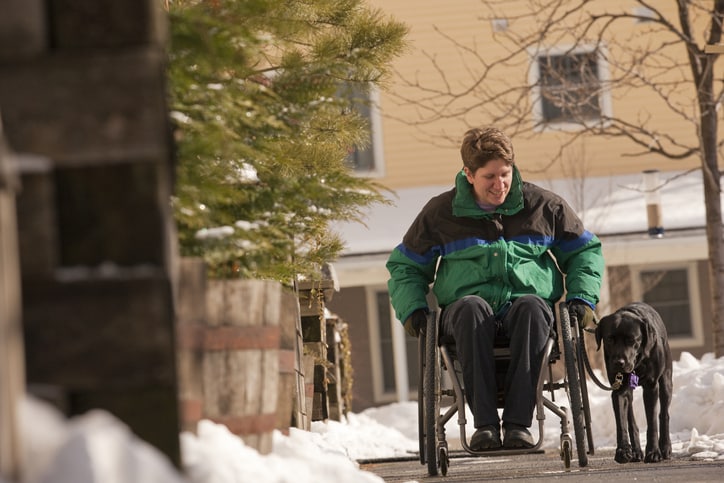By Stacy Alcide, RN
Certified Aging Life Care Manager
MS Awareness Week: March 7 – 13, 2021
What is Multiple Sclerosis (MS)?
MS is a chronic condition where the body’s own immune system attacks the central nervous system (brain, spinal cord, and optic nerves). The damage and inflammation to these nerves interrupts the signals from the brain to body which leads to debilitating symptoms over time.
Causes of MS: The cause of MS is still unknown, but it is thought to be linked to genetic and environmental components.
Symptoms of MS
Symptoms may vary for each person, but common symptoms include:
- Fatigue: may not improve with rest. Experienced by 80% of people with MS.
- Numbness or Tingling: often described as “pins and needles’” or an electrical shock.
- Weakness: weakness in extremities or on one side of the body.
- Walking: difficulty lifting the leg or foot.
- Muscle Spasms: painful, uncontrollable movements in extremities.
- Vision Problems: blurred or double vision.
- Bladder Problems: frequency, urgency, retention, and incontinence.
- Bowel problems: constipation is common.
- Dizziness: loss of balance and frequent falls.
- Cognitive changes: short-term memory loss and slower to process information.
- Depression: can occur as a symptom of MS and as a result of MS.
- Sexual Dysfunction
Advanced Symptoms of MS
- Immobility: requiring assistance with bathing, dressing, mobility, eating, transfers.
- Speech difficulties: mumbled speech especially when tired.
- Swallowing difficulties: need for chopped diet or thickened liquids.
Risk Factors for MS
- Age – usual onset occurs between 20-40 years of age but can occur anytime.
- Sex – women are two to three times more likely as men to have MS.
- Genetics – family history of MS.
- Infections – having a history of viruses, including Epstein-Barr (cause of Mononucleosis).
- Race – white people are at highest risk.
- Vitamin D – low levels of vitamin D and low exposure to sunlight.
Diagnosis of MS
There is not one single test that can diagnosis MS. A diagnosis of MS is made after a detailed medical history, a neurologic exam, and other tests including magnetic resonance imaging (MRI), spinal fluid analysis, and blood tests to rule out other conditions.
Four Types of MS
- Relapsing-Remitting MS: This type of MS is the most common form. About 75% to 85% of people with MS are diagnosed with this type. People experience periods called relapses, flare-ups, or exacerbations. They typically last a few days or weeks. At other times the symptoms seem to disappear, which is called a remission.
- Secondary-Progressive MS: With this type of MS, symptoms worsen over time. People can have episodes with or without the occurrence of relapses and remissions.
- Primary-Progressive MS: This type of MS is not very common, occurring in about 10% of people with MS. It is characterized by slowly worsening symptoms from the beginning, with no relapses or remissions.
- Progressive-Relapsing MS: This is the least common type of MS (5%). People have a steady decline in disease state from the beginning, with acute relapses but no remissions, with or without recovery.
Three Tips on caring for Loved Ones with MS
Loved ones with MS are often struggling with daily life, especially as the disease progresses. Physical, emotional, and financial problems are common. They often do not want to burden others as their needs increase and are too proud to ask for help.
Here are 3 tips to help those with MS.
- Consider reaching out and providing simple things that would mean so much, i.e., a ride to appointments, delivering groceries, routine visits or phone calls for support.
- Encourage routine follow-up with their primary care physician and neurologist. Many people find it hard to get out of the house due to a lack of energy and need for physical assistance. While there is no cure for MS, routine follow-up with their doctors is important to manage symptoms.
- Motivate your loved one to complete daily exercises and stretching. This is important to manage symptoms such as spasms. It has also been noted that exercise can benefit with bowel and bladder function, decrease fatigue, and improve overall mood.
Support Services
The National Multiple Sclerosis Society and the Multiple Sclerosis Foundation are useful resources that offer grants, MS programs, MS support groups, and increase awareness of MS in the community.
National Multiple Sclerosis Society (NMSS) call 1-800-344-4867 or visit https://www.nationalmssociety.org/
Multiple Sclerosis Foundation (MSF) call 888-MSFOCUS or visit https://msfocus.org/
About The Option Group: Founded in 2010, The Option Group’s compassionate team of experienced Certified Life Care Managers serves families, their loved ones, medical professionals, and professional family advisors in Maryland, Pennsylvania, and Delaware. The firm understands the challenges of caring for an individual who needs assistance due to aging, dementia, disability, or serious illness. Their skilled providers possess over 100 years of combined experience navigating the healthcare maze and accessing hundreds of quality resources. The Option Group helps families spend quality time with their loved ones, providing clear choices that lead to better care. For more information, visit www.theoptiongroup.net or call 410-667-0266 (MD) or 717-287-9900 / 610-885-8899 (PA) / or 302-858-6449 (DE).

